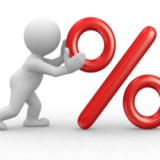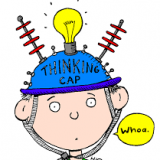Practice Test : Reading Comprehension

When consumers finish their Christmas buying, another shopping season will be just beginning: retailers will be bought and sold by other retailers. Britain, in particular, may face a wave of retailer acquisitions.
Wal-Mart especially terrifies its European counterparts, because its high-tech supply system and mass-buying power enable it to command the lowest prices from suppliers. Since Wal-Mart bought Britain’s third-largest supermarket chain, Asda, for just under $11 billion in cash last June, the share prices of nervous British rivals have started to plummet.
But Asda’s retiring chairman, Archie Norman, thinks the stocks have fallen too far. In early November he and three friends invested $8 million in a shell company called Knutsford. Their $8 million was nominally worth $200 million the next day, and when Norman said Knutsford intended to buy “undervalued retail operations”, private investors fought to purchase the company’s few remaining available shares.
Little Knutsford presumably cannot gobble up Britain’s two struggling retail giants, but a bigger company may do so. One of these troubled retailers is Marks & Spencer, a national icon. In 1996, Britons bought 40% of their lingerie, 25% of their men’s suits, and 6% of their food in M & S’s 700 shops.
Founded in 1884, when Polish immigrant Michael Marks opened a penny bazaar in a market stall in Leeds, the company grew rapidly a generation later under the leadership of Michael’s son, Simon (later Lord) Marks. Simon Marks would descend on his stores unannounced, throw anything he considered substandard to the ground, and yell, “Are you trying to ruin my business?” In 1964 he visited a women’s department that stocked shorter miniskirts than he had approved and died of a heart attack.
For many years, M & S was held up as an example of enlightened business practices. It trained its staff and suppliers exhaustively, promoted from within its own ranks, and bought from British suppliers on long-term contracts. Its strategy of buying British turned out to be disastrous. While its competitors were ordering from cheaper, faster overseas suppliers, M & S was placing orders in huge quantities with expensive British firms who took up to 12 months to deliver–by that time, fashions had changed and the clothes were out-of-date. M & S eventually became known for being rather dowdy. At the same time, the M & S culture grew inbred and slow to adapt to change. As a result of these problems, the company’s stock price has sunk 50% since 1997.
The second major British retailer in crisis is J. Sainsbury & Sons’, which, until 1996, was Britain’s largest grocer. Its share price also has dropped by nearly half in the past two years. Sainsbury family members still own 40% of the company; the younger ones may be willing to sell for a decent price. Founded in 1869, J. Sainsbury experienced its fastest growth a century later when the founder’s great grandson, John, took over. John Sainsbury was wont to land his helicopter unannounced on the flat roofs of his stores, but he was also courteous to all his employees, provided they lived up to his rigid rules. Of these rules, the most important was to maintain a sales density of at least $33 per week for every square foot in the store. In 1912, John Sainsbury (who was made a lord by Margaret Thatcher) retired in favor of his younger cousin David (who has been made a lord and government minister by Tony Blair). Though everyone agrees that David is a nice fellow, he and his successors saw Sainsbury slip behind an upstart, Tesco, which introduced even tougher performance rules and more innovative service. Sainsbury’s, like M & S and Britain’s fourth-largest supermarket chain, Safeway, is a likely candidate for takeover in the near future. The fifth largest, Somerfield, is trying to sell its 140 best stores, but will probably fail to sell its 350 worst ones.
Foreign takeovers seem less likely to succeed in France, where supermarkets are amalgamating into national icons, protected by local authorities. Optimists say this atmosphere is changing, but I would hesitate to invest early in any foreign intruder who seeks to flood France with the cheapest Asian textiles and most efficiently produced American hormone-treated beef.
That is why Wal-Mart has made its first European invasions during the past two years into price-conscious Germany. Wal-Mart seems confident that the stores it has bought can beat the locals in service (which in Germany is atrocious) while cutting prices even further. If Wal-Mart succeeds in Germany, it should succeed in equally free-trading Britain, although primarily in non-food products. The food market in Britain is challenging to enter for several reasons: there are planning restrictions against large out-of-town warehouses, gas taxes are high, and Tesco is already thriving as an efficient grocer in an overcrowded market. One way or another, though, Europe’s main streets are changing fast.
- Which of the following can be concluded from the passage?
(A) European retailers have ample reason to dread the American retail company Wal-Mart.
(B) More than 6% of Britons buy their food from J. Sainsbury & Sons.
(C) Wal-Mart is determined to become a major retailer in Europe.
(D) John Sainsbury and Simon Marks shared a similar disposition.
(E) None of the above.
2. As compared to France, Germany is
(A) More open to takeovers by international companies.
(B) Less self-conscious about nationalism, protection from the state government is rare.
(C) More interested in cheaper goods.
(D) Less concerned with customer satisfaction and quality service.
(E) None of the above.
3. The company in which Archie Norman and friends invested $8 million is
(A) Aiming at opening retail outlets in Britain.
(B) Likely to be involved in the manufacture or sale of clothes.
(C) A small retail operation that is aiming to expand by buyouts.
(D) Not offering any product or service.
(E) None of the above.
4. Knutsford was worth $200 million the very next day because
(A) Archie Norman’s association with Asda was enough to lure private investors.
(B) Investors believed that some retail operations were undervalued.
(C) Archie Norman had obtained $11 billion in cash from the sale of Asda.
(D) Retail operations were perceived as a very good investment.
(E) Knutsford was likely to buy out the bigger retail outlets in Britain.
5. Given what the passage says about the success of Wal-Mart, which of the following reforms, if carried out, would be most likely to insure the continued success of M & S?
(A) A complete overhaul of the supplier base to insure that it makes volume purchases at globally competitive rates.
(B) A marketing campaign to popularize its brand.
(C) Recruiting senior managers from outside and purchasing from global sellers without any purchase guarantee.
(D) Training staff for changes in the business environment
(E) Looking towards international rather than British trends and purchase accordingly.
6. With which of the following would Walmart have difficulty competing?
(A) Sainsbury
(B) Tesco
(C) Safeway
(D) Somerfield
(E) M & S
7. A hostile takeover would be unnecessary in the case of:
(A) M & S
(B) Sainsbury
(C) Safeway
(D) Tesco
(E) Somerfield
8. Which of the following is not mentioned as an obstacle to success in entering the British retail food market?
(A) Strict law on food preservation
(B) The need for large out-of-town warehouses
(C) The presence of a well-entrenched retail outlet
(D) An overcrowded grocery market.
(E) High taxes associated with transportation
9. One may infer that France is less susceptible to foreign takeovers mainly because
(A) It does not believe in free trade.
(B) It is not very price conscious.
(C) It is a closed economy.
(D) It is biased against American products.
(E) It is very nationalistic.












